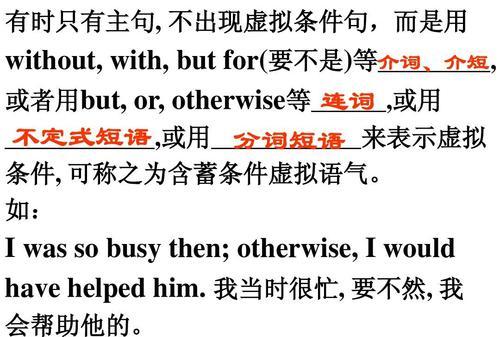"but for"虚拟语气在英语中用来表达如果没有某个因素或事件,结果会有所不同。例如,“But for the rain, we would have gone to the beach.” 通常,"but for"后面的内容表示导致结果发生的原因或事件,而过去分词和情态动词(如would/could/should)则用来表达假设的结果。需要注意的是,"but for"虚拟语气通常表示不可能实现的情况,不用于表示可能会发生的情况。

- But for the rain, we would have gone to the beach.(如果不是下雨,我们就去海滩了。)
- But for his help, I would have failed the exam.(如果没有他的帮助,我就会考砸了。)
- But for her advice, I would have made a mistake.(如果没有她的建议,我就会犯错了。)
- But for the traffic jam, we would have arrived on time.(如果没有堵车,我们就会准时到达。)
- But for his injury, he would have played in the final.(如果没有他的受伤,他就会在决赛中出场。)
以上例句中,but for后面的内容表示导致结果发生的原因或事件。在虚拟语气中,我们使用过去分词来表示假设的情况,再加上would/could/should等情态动词来表达假设的结果。
但需要注意的是,but for虚拟语气通常表示不可能实现的情况,因此它不用于表示可能会发生的情况,而是用于陈述假设的场景。

